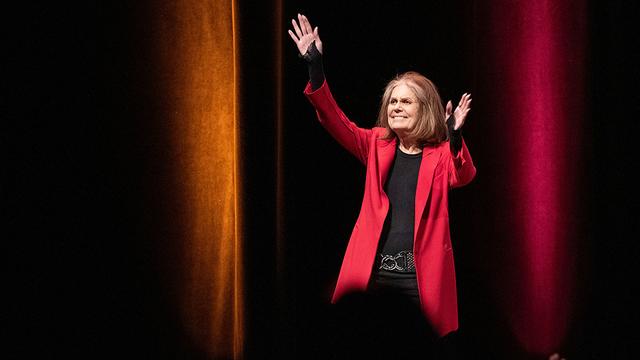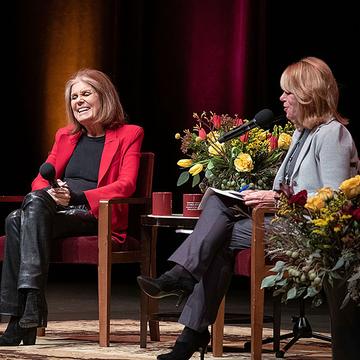Gloria Steinem’s appearance on stage at the University of Minnesota last week felt at times more like a rock concert than a public policy conversation, with a capacity crowd at Northrop clapping and cheering in appreciation for her role as a key founder of the women’s rights movement.
After some 50 years in the public eye, Steinem is one of the most well known and influential feminist organizers and political activists in the world. At 85, Steinem looked a bit like a rock star in her black leather pants, wide silver-studded belt, and red blazer. But the impact she clearly had on the lives of those in the audience was most obvious.
Humphrey School Dean Laura Bloomberg spoke for many of them in her opening remarks, recalling that when she was in her 20s and struggling to find her own self-identity, she started reading Ms. Magazine, which Steinem founded in 1971, at her local library.
“Between magazines that told me what to wear, or how much I should weigh, or what kind of makeup I should buy, what I should say on a first date if I wanted a second one … there was [Ms. Magazine] a publication that opened doors for me. It told me I had the right to my opinions; it told me, in fact, I had the obligation to share those opinions and those big ideas with the world. It told me I had a right to be heard. Ms. Magazine became a lifeline for me,” Bloomberg said to rousing applause from many in the audience who had similar experiences. “And all these decades later, I can still say that Gloria Steinem remains a role model for how to aspire to be the best me I can be every single day of my life, and I am so grateful to her for that.”
Steinem appeared as part of the Distinguished Carlson Lecture Series, presented by the Humphrey School of Public Affairs with support from Carlson and the Carlson Family Foundation.
Her conversation with moderator Kerri Miller of MPR News was wide ranging, touching on the history of the women’s rights movement, her own personal history, and the politics of the day.
Here are some excerpts from that conversation, which have been edited for length and clarity.
The beginnings of her involvement in the women’s movement:
I was a columnist for New York magazine, and went to cover an abortion hearing in downtown Manhattan because the state Legislature in New York was considering liberalizing its abortion laws, and they had invited to testify 14 men and one nun.
A group of early feminists said, ‘Let’s hear from women who’ve actually had the experience of seeking and having an illegal abortion.’ The hearing was in a church basement in downtown Manhattan.
I went as a reporter to listen and my life was never the same after that because I, for the first time in my life, heard women standing up and telling the truth about something that only happened to women, that was illegal, unacceptable, but happened to many women around the country. … I had had an abortion too, and not told anyone.
So suddenly I thought, why are we made to risk our lives, and why is it illegal? And that was like the thread that started to unravel everything.
In hindsight, what she would have done differently:
I would have started much earlier. Remember, I was a 1950s person. It took me a while to know that things could be different. Up to then I was rebelling, but secretly. I hoped no one would notice that I was rebelling. I didn’t see a women’s movement until I was in my late 30s and early 40s. That was a huge relief, like the lights coming on.
On patriarchy:
The nature of patriarchy is to control women’s bodies as a means of reproduction. If women did not have wombs, we would be fine. If there’s racism as well … then it becomes even more important because they have to doubly control reproduction to maintain racial separation.
It’s not only that we live in a patriarchy, it’s that patriarchy lives in us. We are all the product of how we were raised in our families, and if our families were not democratic families—that is, women raise children more than men did—we absorb that. And we absorb the idea that if there is a hierarchy in our family then it must be inevitable. And this, I think, we’re just beginning to connect to our understanding of national and world politics.
The biggest indicator of whether there is inequality and violence in any country is not economics or access to natural resources or even degree of democracy. It is violence or inequality in the home … because that’s where we learn that it seems inevitable that one group was meant to be superior over another. So we’re never really going to have a democracy until we have democratic families.
Speaking up about race and gender inequality:
It's a big thing. When white folks are together, do we say, ‘What’s wrong with this group [I'm in]? It doesn't look like the country. I’m culturally deprived.’ It would probably help if we didn’t do it in a guilt-producing way, whether it is about race or sex. We should do it in a way that says, it is to the advantage of the segregated group not to be segregated. We do not learn from sameness; we learn from difference.
It might be helpful if we think of it positively. We white folks are being deprived. Men are being deprived. We all have the full circle of human qualities, women and men, and if men are confined in a masculine way they are missing the rest of themselves. All the ability to express emotion, or all the other things they’re not supposed to do because it’s considered feminine, including standing up for women. We should all be trying to express our whole humanity, and allow everybody’s whole humanity. Hopefully men with daughters understand that better, because their egos get invested in their daughters.
What it would take for the United States to elect a woman as president:
I’m not sure, because it all depends on so many factors. In a long-term deep way, we won’t be able to fully see women as human beings until men are raising children as much as women are. I say that because when Hillary Clinton was running, I saw many male journalists on television saying things like, ‘She reminds me of my first wife outside alimony court,’ saying insane things.
I think that’s because all of us are still mostly raised by women, and that means that we associate female authority with childhood. For men especially, when they see a woman in authority over them—the last time they saw that they were 8 years old. Without thinking about it they feel regressed; it doesn’t feel right. It feels emotional, not rational. I’m not sure we will be able to fully accept the authority of women outside the home until there is equal authority of men inside the home.
How to ensure women are at the center of making choices about their bodies:
Vote. We have a right to a democracy. There is no democracy unless we—women and men—control our own bodies and voices. That is the basis of democracy.
See more photos from the event
About the Distinguished Carlson Lecture Series
For nearly four decades, the Humphrey School of Public Affairs, with support from Carlson and the Carlson Family Foundation, has presented the Distinguished Carlson Lecture Series, bringing to Minnesota world-renowned speakers to participate in a forum dedicated to the presentation and discussion of the most important policy issues of the day.
The series began in 1980 with a gift from Curtis L. Carlson to honor his late friend, Hubert H. Humphrey, and to “contribute to the intellectual life of the greater Twin Cities community by sponsoring lively forums of broad interest.”
Previous lecturers include Presidents Jimmy Carter, George H.W. Bush, and Bill Clinton, as well as Jon Meacham, Toni Morrison, and His Holiness the 14th Dalai Lama. See the complete list here.



